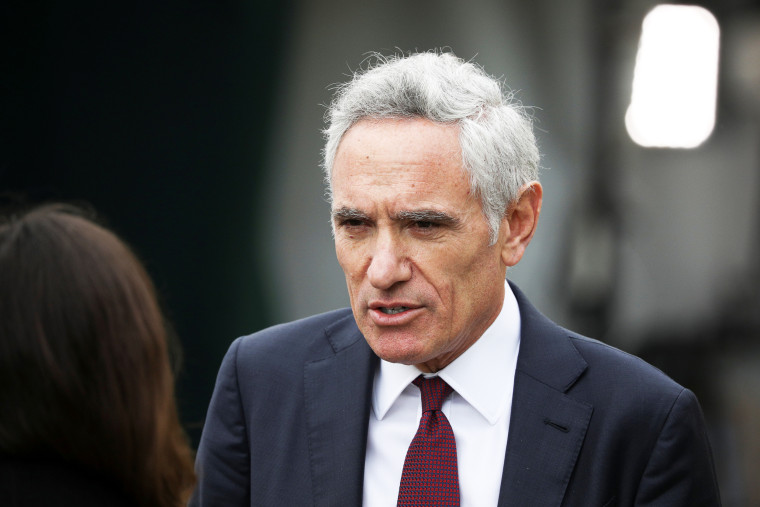WASHINGTON — President Donald Trump’s top medical adviser on the coronavirus pandemic, Dr. Scott Atlas, has not attended White House task force meetings in person since late September, according to two administration officials, as he continues to spread misinformation about the worsening health crisis.
The growing split between Atlas and task force leaders came after the group’s leading medical experts — Dr. Deborah Birx and Dr. Anthony Fauci — indicated that they did not appreciate Atlas’ controversial input or contributions in the Situation Room gatherings.
“That was done in deference to Fauci and Birx because they basically said they will not work with him,” a senior administration official said about the adviser's absence at the meetings.
Atlas, who became the group’s newest member in August and frequently works in the White House complex, has been elevated by the president in recent weeks because his views align more closely with Trump’s in terms of downplaying the seriousness of the virus and questioning the efficacy of masks.
Atlas has repeatedly criticized statewide restrictions and argued that the isolation caused by them will do more lasting damage than the disease itself, contrary to most public health officials.
And in an interview on Fox News this week, he appeared to encourage larger holiday gatherings this season, claiming: “For many people, this is their final Thanksgiving, believe it or not. What are we doing here?”
Atlas, a neuroradiologist, has no background in infectious diseases and his recent provocative statements have even caused Stanford University — where he is on leave from a fellowship at the Hoover Institution — to publicly distance itself from him.
“We support using masks, social distancing, and conducting surveillance and diagnostic testing. We also believe in the importance of strictly following the guidance of local and state health authorities. Dr. Atlas has expressed views that are inconsistent with the university’s approach in response to the pandemic,” the university said in a statement Monday.
The White House declined to comment on why Atlas continues to do media interviews from the North Lawn when he hasn’t been part of recent task force meetings or whether he is receiving a government salary.
Over the summer, Atlas frequently appeared on Fox News and ultimately caught the eye of the president, who invited him to join the group managing the pandemic response. Once there, he quickly clashed with Birx and Fauci, as well as the head of the Centers for Disease Control and Prevention, Dr. Robert Redfield.
Redfield was overheard by NBC News on an airplane in September complaining about Atlas’ expanding influence and claiming that “everything he says is false.” Redfield was expressing alarm in a conversation with a colleague over the close relationship the president had formed with Atlas as the pandemic continued to worsen.
When Atlas tweeted “rise up” in response to new Michigan health and safety guidelines this week, after its Democratic governor had been the subject of a foiled plot to kidnap and kill her, he later had to clarify that he didn’t mean to imply violence.
Fauci, during an interview on the "TODAY" show on Monday, responded: “I totally disagree with it, and I made no secret of that. I mean, I don't want to say anything against Dr. Atlas as a person but I totally disagree with the stand he takes. I just do, period.”
Birx and Fauci, after becoming a near-daily presence in the earlier months of the federal response, have not appeared in the briefing room with the president for months. Instead, when the president resumed sporadic press conferences on the virus in August and September, he would sometimes invite Atlas to join him and answer some questions or make brief remarks.
For all of October and so far in November, however, there have been no press briefings at the White House from any of the medical experts on the task force to address the spread of the virus or the skyrocketing cases and hospitalizations. One was added to the schedule for Thursday afternoon but it’s unclear exactly who will participate.
The administration has touted encouraging vaccine developments in recent weeks but hasn’t taken questions from reporters on how it will work with the incoming Biden team on a distribution plan in the months ahead. A smooth transition continues to be stalled by the General Services Administration, which has yet to certify the outcome of the election.
The president, for his part, hasn’t attended a task force meeting since April or May and has no plans to attend any in the coming weeks, according to an administration official. He has left that responsibility to Vice President Mike Pence, who has chaired the group since February.
Neither Trump nor Pence have publicly acknowledged the news this week that more than 250,000 Americans have lost their lives to the virus.
Pence has held more frequent meetings on the coronavirus in the weeks since the election, compared to those before. For the first time in months, the vice president is leading two task force meetings in the span of one week. The gatherings had become only weekly occurrences in the late summer and the early fall.
The consensus from the group in a recent report, shared with states privately but not released publicly in recent days, contained an extremely dire warning.
“There is now aggressive, unrelenting, expanding broad community spread across the country, reaching most counties, without evidence of improvement but rather, further deterioration,” the task force wrote. “Current mitigation efforts are inadequate and must be increased to flatten the curve to sustain the health system for both Covid-19 and non-Covid-19 emergencies."


